Going off grid is a dream for many. It has become the ultimate symbol of freedom; living your own life, your own way, without having to concern yourself with what society is doing. Better yet is the idea of not having to pay society for everything you need. But getting to that place is not something easy.
Of course, going off grid means different things to different people. On the most basic level, it’s disconnecting from the electric grid and producing your own electricity. But if you’re going to do that, then it makes sense to disconnect from other utilities as well, getting water from your own well, not using natural gas for heating or cooking, and handling your own wastewater. Taking that a step further, why not become totally self-sufficient and grow your own food as well?
Can you do all that? The simple answer is “yes.” Many others have done so and done so successfully. That doesn’t mean it will be easy though. You need to think things through before tackling that big move and you’ll be best off taking it slowly. Don’t try to do everything at once, but rather work your way from where you are now to where you envision yourself in the off grid life you want.
Here are a few of the key things I wish I had known, before trying this myself.
#1. Off Grid Power Is Unreliable
As a society, we’re addicted to electrical power. While it is possible to live without it, it’s much easier to live with it. For me, as for many others, going off grid started with the idea of producing my own electrical power and eliminate that high monthly electric bill.
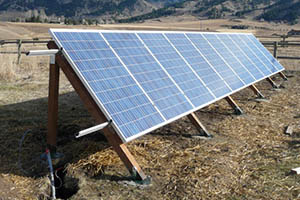 There’s just one thing, it’s not all that easy to produce your own electricity. Setting up a few solar panels and a small wind turbine is only going to get you a limited amount of power. You’ll either need a whole lot bigger system or find ways to do things without electricity. It has taken me years to build enough solar panels to meet my needs; and that’s with doing a lot to use my electricity in the most efficient ways possible.
There’s just one thing, it’s not all that easy to produce your own electricity. Setting up a few solar panels and a small wind turbine is only going to get you a limited amount of power. You’ll either need a whole lot bigger system or find ways to do things without electricity. It has taken me years to build enough solar panels to meet my needs; and that’s with doing a lot to use my electricity in the most efficient ways possible.
One overcast day, storm or week without wind can ruin all that though. Unless you have a massive battery backup system for the power you produce, you’re probably going to have times when you run out of power. Be ready for them.
Related: How to Tell in 5 Minutes If It’s a Power Outage or an EMP and Get a Massive Head Start
#2. DC Appliances Are Great
Our homes normally use AC appliances, lighting and anything else that requires electricity. In some cases, that electric power is converted to DC, before being consumed.
Your alternate power system is going to be all DC. In order to use AC appliances, you need to run the power from your battery backup system through a voltage inverter, changing it from 12 volts DC to 120 volts AC. Inefficiencies in this process will cost you power that you need.
The solution is to use DC appliances whenever possible. This is how recreational vehicles work and you can too. Granted, DC appliances are more expensive; but they will save you electrical power. Ultimately, that’s more important.
You can do the same for lighting, replacing normal lighting with 12 volt LED lights. Of course, you can also go with oil lamps and candles, but I prefer modern conveniences, even while wanting to go off grid.
#3. Good Soil Is Everything, if You Want to Eat
I’m not a natural gardener. In fact, I used to say that I had a “brown thumb” instead of a green one. Learning how to grow my own food hasn’t been easy. But I will say this; soil is everything. Plants can’t grow where there is no soil and poor quality soil is just about as bad as not having any at all.
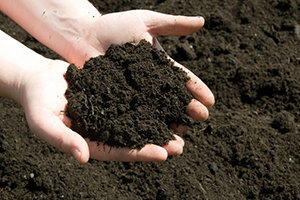 It takes a minimum of one year to build good soil, and that’s if you bring in the best possible components and mix them on site. I spent three years getting to the point where my soil was actually growing a reasonable crop. One year there weren’t enough nutrients in the soil.
It takes a minimum of one year to build good soil, and that’s if you bring in the best possible components and mix them on site. I spent three years getting to the point where my soil was actually growing a reasonable crop. One year there weren’t enough nutrients in the soil.
The next year, there was too much compost, generating too much heat as it broke down. Finally, in the third year, things were starting to work. But it was the fourth year that I saw a good return for my labor.
Once I hit my stride, I found out that my garden wasn’t big enough. So I had to start all over again, hauling in components, so that I could increase the size of my garden. But that time, I was able to get my soil up to snuff in two years, getting a good crop that second year.
#4. Water and Wood Are Heavy
Two things we all say we’re going to get from nature are water and firewood. Both are possible; but both are difficult to do. Pumping your water by hand is a lot of work, especially when you consider that you need it for your garden as well. A five-gallon bucket of water weighs 40 pounds, and it won’t take all that many of those 40 pound bucket to appreciate exactly how much that is.
You’ll want some way of moving water, which allows you to avoid all that pumping and carrying. I stole a page from the ranchers for that, setting up a water tank with a wind-powered pump. By placing it uphill of my garden area, I was able to plumb in a distribution network, using gravity feed to get the water to my garden.
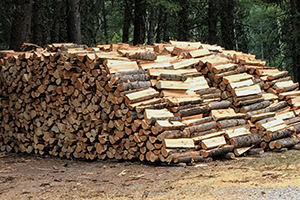 Firewood is just about as bad. I started out using deadfalls, which are much lighter and easier to move. But even those are heavy; so forget about moving them by hand. If you don’t want to move them by hand, you’ll have to have some sort of vehicle that can haul wood, either a gasoline powered one or an animal powered one.
Firewood is just about as bad. I started out using deadfalls, which are much lighter and easier to move. But even those are heavy; so forget about moving them by hand. If you don’t want to move them by hand, you’ll have to have some sort of vehicle that can haul wood, either a gasoline powered one or an animal powered one.
Related: How to Store and Stack Firewood The Right Way
#5. Insulation Is Wonderful
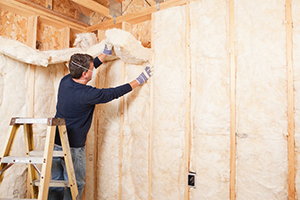 Keeping your home warm in winter and cool in summer isn’t easy. That’s our single biggest energy use. As part of going off grid, you’ll really gain an appreciation of what that means. Proper insulation of your home is critical for both. Keeping the heat in during the wintertime and out during the summertime is all about having proper insulation.
Keeping your home warm in winter and cool in summer isn’t easy. That’s our single biggest energy use. As part of going off grid, you’ll really gain an appreciation of what that means. Proper insulation of your home is critical for both. Keeping the heat in during the wintertime and out during the summertime is all about having proper insulation.
When you design your off grid home, be sure to put heating and cooling at the forefront of your plans. Ultimately, being comfortable is more important than having a view. You can always go outside to get that view.
If you can, using solar power is very helpful. But remember, using solar power means you’re going to have large windows that heat can escape out through. So you’ll want some way of covering those windows up at night, like a heavy blanket, preventing the heat from radiating out through them.
#6. You Only Know What You Know
Living off grid requires learning a whole new batch of skills. I mentioned my struggles with learning to garden earlier. That was only the beginning of my learning troubles. I’ve had to learn a wide range of other skills as well, from how to care for my chickens, to how to care for a broken leg.
The good news is that many of those skills are things that were considered common knowledge to our ancestors. So it’s not like we’re talking about becoming a rocket scientist here. Rather, we’re talking about the everyday things that need to be done; it’s just that the list is different from what you and I have grown up being used to.
This is probably the biggest reason for going slow, when you’re working on going off grid. Take one or two areas at a time and work on them. Then, when you’re getting comfortable with those, you can start adding other things to your off grid lifestyle. That will help keep you from becoming overwhelmed by all you need to learn how to do.
Related: Homesteading While You Are Sick For A Long Period Of Time
#7. Help Isn’t as Close as You’re Used To
If any of us living in the city need help, all we’ve got to do is get on the phone and dial up our local expert. Not so when living off grid. Yes, the internet is there and your cell phone may even have signal, but if you call for help, it’s going to take a lot more time for it to get to you.
Being self-sufficient doesn’t just mean being so when things are going good, it means being so when everything goes bad. Can you provide effective first-aid if your spouse cuts their leg with an axe? As many others have learned, things like this can cost lives, if you’re not ready to deal with them. But if you know how to deal with them, they can be overcome, even without outside help.
You may also like:
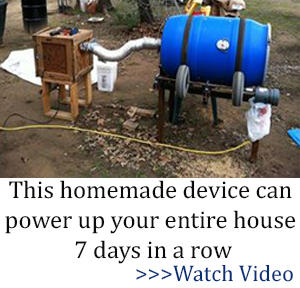 The Best 5 States for Living Off-Grid
The Best 5 States for Living Off-Grid
10 Things Cowboys Carried With Them in the Wild West to Survive (Video)
What To Do With Your Frozen Food If The Power Goes Out
Homesteading After 60 What You Need To Know
Best Fuels For Off-Grid Survival

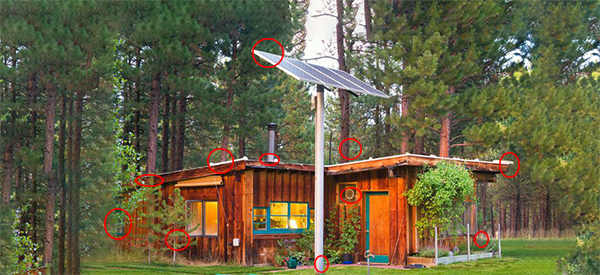







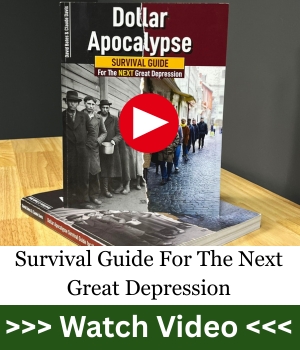



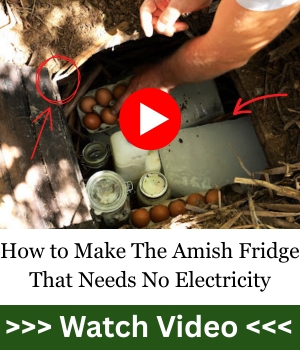

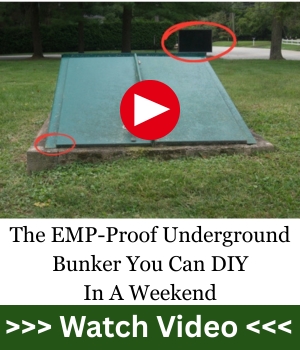






Also…..have backups for your backups. Have a manual tool for every electrical tool in case your off grid power supply fails.
This includes for drinking water. We have an Emergency Well Tube (www.emergencywelltube.com) to protect against power interruptions and mechanical pump failures.
Excellent advice! And common sense really….
wont lie to you,i have a contingency to almost everything that could come up,both contingency gear and a plan, as a highschool sophomore a school shooting is a possibility,and because of that i know my way around my school itself and the area around it for 30 kilometers (about 24 miles i think) and even carry a concealed knife in my bag in the case that i have to defend myself or someone i care about (thats only one example)
Clever lad! lol
young prepper,
When in a stressful situation we all do the freeze, fight or flight; but, what saves us is the decision time to transition from freeze to another state and having a plan can help that immensely. Running scenarios in our head for conceivable events and knowing the surroundings and where we might find cover or concealment can get us out of danger faster than someone caught unaware so keep up the planning.
It’s actually only about 18 miles.
While I understand you wanting a self defense tool, have you considered the consequences if you get caught just having it with you. Just be aware.
Getting a Ham Radio license can be a bonus for off the grid communications
An Amateur (ham) radio license can be an important item in an off grid or on grid system, since it gives you communications options.
The license no longer requires learning the Morse code, the tests are easy for the first license (Technician class) and radios start at less then $50.00.
I’ve been a ham for more than 40 years, and the community keeps growing as the equipment just keeps getting better and less expensive.
After reading all this, I figure I am too old to do all of this.but it looks great. Wish I knew about it many years ago, when I was young. A great job you did and I thank you for doing things step by step. thank you for all of that.
And I like your canning ideas also.
Don’t forget earth-sheltered homes. The single outside wall with all glass captures sunlight, while heat absorbing tile floors just inside capture the heat & release it inside as needed. The surrounding earth insulates (remember the consistant temps of a cave). Good soil coverage on the roof allows gardening. Equally important, the single exposed wall makes for much easier defense, if needed. Add solar panels & wind turbines & most of that captured power can be mostly used for appliances. It’s fairly expensive to build, but so is every other option.
This is the first time I saw the living area, the bunch of wood, Just looking at at all that is done, everyone would
love to have a place like this. It makes you feel at home.
thanks for all tips and how you fixed up for electricity.
a great job.
Great advice. Thanks for taking the time to post your hands-on experience in off-grid living. Too many folks today don’t realize how mean an existence pioneers and most farmers lived in the early centuries of this country and just how much of a struggle just existing was.
My step-cousins are living mostly off the grid in WA. But they planned it far ahead. Every summer for 4 years they transported all sorts of things up there to get ready to build when they actually went to live up there. They eve built the shell of their home so they just had to complete the inside when they moved there. Luckily they brought more building materials and food to last them until they had their greenhouse built, because a bear had broken into the house and spent the winter in it! At first, they all lived upstairs with the animals downstairs for heat when they first arrived (after cleaning up from the bear!). After they built the chicken and goat living quarters and a paddock for the horse (and later, a llama!) they converted the downstairs to living quarters. They used the barter system to obtain much of what they did not bring themselves. They would go into town 1x/month for any supplies needed. The wife would send an e-mail to let family know they were ok. They are starting their 2nd yr this year.
The comment about the helicopter ride really struck home with me.
A close friend lives in a small community between two medium sized communities about 40 miles in each direction, perhaps the smaller of the medium sized communities is a little closer. Of course, medium sized is open to interpretation, so the larger town is 47,000 and the smaller 31,000.
He suffered a significant heart problem. The town where he lives had basically a doc-in-the-box, and he needed rapid transportation to the larger town quickly. A med-evac helicopter was ordered. He got the medical treatment he needed which saved his life. He also got an enormous helicopter ride bill which his insurance did not cover. Helicopters are very expensive to operate. They take skilled pilots, more so than flying a small twin engine King Air or single engine Cessna, but they can land on the turn around in a cul-de-sac which neither of the aforementioned a/c can do. Add in a couple of cardiac emergency EMTs and the bill takes a rapid climb upward.
He lived, but the helicopter ride made a significant dent in his portfolio.
We see helicopter rescues all the time, but the media never mentions the bill that frequently accompanies that life-saving ride. Medical insurance only covers a small portion of emergency transportation. A 1 1/2 mile ride to the E.R. cost me $800, was covered by Medi-Care and a supplemental health insurance policy and still cost me $800. I can’t imagine what a 40 mile ride in a helicopter costs. I just know it is what my friend called “significant.”
Of course, rates vary in different parts of the country, so my experience and my friend’s experience may be different from your area, but it is always something to consider when one is contemplating a move to the countryside. How far away is a complete hospital? How are the roads between your home and the hospital? Where is the emergency service located? Is it volunteer or paid EMTs? That is not to denigrate volunteers. They are highly motivated, dedicated individuals who provide an enormously valuable public service, but they don’t live at the ambulance garage. They have to drop what they are doing and get to the ambulance and then get to you. Paid folks theoretically are stationed with the ambulance and can leave sooner, possibly, than volunteers.
Is there helicopter emergency service available within a reasonable time frame?
All those questions become of increasing importance when considering children and as one ages.
Heard the helicopter early one morning in our valley, trying to find a place to land to pick up a car wreck victim. The hospital they go to is 9 miles away on a lightly traveled road (especially at that early hour). By the time the helicopter was called, found a place to land, loaded, and returned, a ground ambulance could have EASILY made the road trip in less time. It’s often simply about the money.
ed,
Are you a first responder?
Do you know for sure they went to the closer hotpital?
Is that local hospital a trauma center and if so, what level?
I routinely work with first responders, and often the paramedic or EMT on scene will call for an air lift (”Life Flight” around here) simply because the flight nurse or paramedic may have a different evaluation and reroute to a local trauma center, often much farther than your 9 miles local hospital, that are often only a Level V center of designated at all.
Life safety often comes before cost evaluation in the field.
That was the problem with my friend. The local doc-in-the box where he was first transported took one look and decided they couldn’t handle the problem. His medical needs exceeded what they could offer. He was already delayed due to the trip to the urgent care center. A road trip from the larger city that had the appropriate hospital set-up would have been at best an hour and a half of extra time for the round trip. I guess the local ambulance could have transported him part of the way and switched when they met the oncoming ambulance. I didn’t make that kind of inquiry and so have no knowledge of why it was done that way rather than med-evac helicopter. Maybe his condition didn’t allow all that handling.
We considered relocating to Mesquite Nevada when we first retired. The nearest hospital was in S. George, UT, approximately 60 miles away and the real estate agent didn’t have a clue whether doctors licensed in Nevada could practice in Utah. So your regular cardiologist might have to treat by telephone or some doctor who is not familiar with your physical problems would be starting over.
In addition the real estate agent also didn’t know if ST George was considered out of area for local medical plans or not.
That went on the list with Eugene Oregon with its massive swarms of mosquitos when we visited there for the same purpose. At night every outdoor light was surrounded by a huge dense cloud of mosquitos. Okay, draw a line through Eugene,
When I was young I had designs for an off grid lifestyle; but, as I needed employment I realized that there is a way to sit in the gap between the “Off Grid” ”Amish” and the grid dependent ”English” which is what we now do. The downside is that it meant driving to work over the years, anywhere from 25-40 miles one way; but, the upside, is freedom to do mostly what we want. A garden & animals, or firing a gun in the back yard are all possible in the ”In Between”
We can do most of that now; but, paying for some of what sosiaty & civilization offers can make life a bit more comfortable, and makes you less of a hermit.
We oretty much look at our lifestyle and technology similar to the local Amish.
Using modern technology is great for convenience; but, when it becomes a necessity, then you need to have alternative means in case it goes away.
I disagree that it makes sense to disconnect from other utilities as well, although in our case those other utilities would only be the telephone.
We enjoy the modern technology and the convenience it brings; but, realize, that complex infrastructure can have problems, so totally relying on it is perhaps not a good idea.
We use grid based electricity; but, have numerous ways to store it, mostly in battery banks, also chargeable via solar systems; but, we can run the entire property, from a whole house propane fueled generator, and keep enough fuel and maintenance consumables on hand to run for months with no changes, or up to a year in austerity mode. We have a good well for water and a septic system for waste; but, also have rain catchment, a creek, and ponds for additional water if needed.
#1. Off Grid Power Is Unreliable
I think addicted is a misnomer, with ”Used to the convenience of” perhaps a better description.
It doesn’t have to be this way; but, it does require proper sizing and enough storage (batteries) to maintain your operation when wind and sun cannot do the job. Duty cycle is also important, doing little jobs while givein g the system a rest to recover.
#2. DC Appliances Are Great
As a ham operator, nearly all of my equipment runs on DC, and every electronic device requires DC provided by some means, even is the standard AC line is the power sources.
One huge modern technology that can help here, is the modern, high output, high efficiency white LED (Light Emitting Diode) lighting source. The standard 800 lumen bulb takes 65 watts in an incandescent, giving off mostly heat; but, uses only a power sipping 8 watts with the LED.
We use solar panels to charge specific batteries for some of the hand tools, so when they are not in use, they are being charged for later use.
This is true, since the typical system captures power from a solar panel or turbine (wind or water) to charge batteries, and then inverts the battery power for use by ”normal” appliances.
Many devices now run from a 5 VDC USB port, so converting the DC (6, 12, 24, 48) DC down to 5 VDC is much more efficient. Most cell phones and tablet may be charged this way, and I have numerous radios that use this technology, so it should be kept in mind.
We do keep candles as well as Coleman and Aladdin mantle lanterns on hand, keeping in mind that the mantle lanterns are great for use during the winter cold, since they not only produce light; but, a significant amount of heat, and can easily take the chill off a room.
On the subject of heat, we use propane with wood backup, keeping a good quantity of both fuels on hand.
#3. Good Soil Is Everything, if You Want to Eat
This just means you always think of your garden plot, building and using a compost bin/ pile, heap, to allow the garden plot to mature and stay ready. It takes little work; but, constant attention.
#4. Water and Wood Are Heavy
Yep and the best investment we made here 35 years ago when we were starting was a ”Strongway Garden Cart — 400-lb. Capacity, 14 Cu. Ft., 48in.L x 29in.W”. Our original was made by Garden Way and is a little expensive; but, it’s still doing the job carrying heavy things after all of these years. This thing has carried hundreds of cords of wood, buckets and barrels of water, and other stuff we needed to move.
We do some gravity feeding from high tanks; but, since the property is rather flat, there is no “up hill” on the property
#5. Insulation Is Wonderful
Over the years this 100 year old house has slowly been upgraded. All new windows, doors, and storm doors. R-40 blown in insulation in the attic space, and expanded foam in the walls. Warm in winter and cool in summer and well worth the money, since sometimes the comfort alone is worth the price.
Not always. I constructed some passive solar heat catchers that sit outside and pour heat into the room, through a window, and simply shut down at night. This video shows the construction of one similar to mine. All of the collecting surface is outside, with the heat coming in via convection, and stopping when the sun goes down. Beats a the problems of a large window.
https://www.youtube.com/watch?v=XmLZkFqfJvM
#6. You Only Know What You Know
True; but, today the internet allows you to figure out anything, and with my engineering background, I’ve found that nearly anything you can conceive of, is possible.
Living off the beaten path, even with the grid has these same challenges; but, we wouldn’t be doing it if we didn’t want those challenges and the lifestyle they allow.
Going slow, is always important, even after you are established. Better to take your time than to have to use your knowledge to mend a wound, most of which happen from impatience. The Pennsylvania Dutch have a maxim that seem to apply here: ”The hurrier I go, the behinder I get”. Short and to the point.
#7. Help Isn’t as Close as You’re Used To
That depends on the help. Need help with a project from a plumber, carpenter or electrician, that’s probably true; but, for a real emergency 911 still works nearly everywhere; but, be prepared after the fact to reimburse the helicopter company
Well stated. It needs to be a lifestyle and not a fad or hobby.
Thank you for taking the time to comment, especially point-by-point with the original poster! Very much appreciated 🙂
going off grid to me means living without power of any sort and living a simple lifestyle. I have done it before.
I feel like we are back in WWII, only worse and that doesn’t make people feel happy. When anyone talks about the good olde days, they are the true ones. My Mother in law had the best black dirt I ever saw. She would say all garbate and plant it in a hole in her yard and her planet grew so great with the rich soil. and her flowers were always so pretty and big. Smart lady
Auge,
You don’t have to go back to WW II, just be in the right area of the country.
We have lots of thick black rich loamy soil here. You’ll often see farmers spreading manure on the fields, and we layer leaves and grass clippings on the garden in the fall after harvest, and toss vegetable scraps into the compost bin year round, using that to amend the soil during the spring and summer.
I love reading how many people love doing hard work, but
I didn’t realize how hard it was until I got older and couldn’t
do them anymore. But, doing and building and growing all
your own things is really what makes a person feel like a
rich person in life, I use to think people that had a lot were so rich, but I find the less you have the richer you really are. I think living in the poorest area of Detroit, made me feel like I was a Princess, those are the days
I remember the most. have a great day everyone
I ordered a book how to build a root cellar and did not receive it my credit card was charged. can you find what happened Please?
New to your blog. Thank you for all the hard work and time it takes to create this and share with us “out here”. This is a wonderful post. I read it and others on off grid lifestyle in order to get an idea for living under society or natural disaster/EMF, etc situation. In this post, if would have been helpful to have some links for the items discussed: ex: DC operated appliances; I’ve never heard of them, and they might be under another term in other locations (I have found this to be true many times: those in the south will call something those in the PNW call by a completely different name)Hence links to what you refer to. Other than that, great post with lots of information.
Thank you